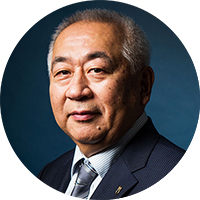Coach's VIEW is a business column authored by executive coaches in COACH A, aimed at providing valuable insights and effective approaches for leveraging coaching to foster organizational and leadership development. The column draws on the latest coaching trends and data, as well as insights from notable global publications on coaching.
Can Subjective View Drive The Future?

"I don't care how you feel. Just do what you have to do!"
"I don't know how many times I've said this to a subordinate ever since I became a manager....."
One manager murmured.
Managers say this to drive the goals of the organization into the future which depends on the performance of their subordinates. It is quite common that in our daily life, we sometimes neglect our subjective views such as our feelings and thoughts to achieve high productivity.
Why is subjective view disregarded?
"Your opinion is too subjective."
"I want you to be more objective."
"That's your subjective opinion, isn't it?"
Does the business world tend to eliminate subjective view and instead view things objectively?
Perhaps one reason is that subjective view is difficult to generalize and capture.
"You need more objective information. The subjective ones are meaningless."
On the other hand, we are humans and therefore subjective. Our five senses are all subjective, thus our views are all generated from subjective experiences.
It can be said that subjective view is all that a person is feeling or thinking, or experiencing. How do you feel if your view is not respected? It's not a very good feeling. That's because you feel like you are not respected for being yourself.
What has the department head done to stop the turnover rate?
One hospital staff member shared an interesting story with me.
The manager, who had been described as cheerful and kind by people in other departments and patients, became the department manager. His management style is;
- Keeps the meetings as short as possible.
- Only a limited number of staff are allowed to speak up or draw conclusions.
- Sometimes, he doesn't even conduct a semi-annual one-on-one meeting with each of his staff members.
- When it comes to a subordinate's career plan, the department head's own attitude was stronger than the subordinate himself.
- After an interview, the subordinates usually do not feel they are understood.
Half of staff members in that department resigned that year.
Given that situation, another new department manager was appointed. This person has a reputation for being hands-on, stern and scary. His management style is as follows;
- Verbalizes what he wants to achieve, "I want this department to be such and such.".
- Gives all staff a chance to speak up and makes sure there is plenty of time for meetings, no matter how busy they are.
- In addition to the semi-annual one-on-one meetings, he even talks with his staff member for a few moments if necessary when they meet in the hallway.
- Listen carefully to his staff's points focusing on what they have to say.
That was the first time they have ever seen such a management style. And not a single person left the hospital that year.
It was not the image of the manager himself, be it cheerful and kind or stern and scary that impacted the members' turnover. The fact that he was intentionally striking up conversations with his subordinates has made a big difference.
What does respecting subjective view mean?
In a survey consisted of store managers from a company with stores nationwide, the characteristics of store managers with high sales and low turnover are usually associated with informal conversations, quick responses, individualized responses, thought-provoking questions, and empowerment.
An informal conversation surrounds topics outside of work, such as about yourself, your physical condition or your personal life. In other words, you are creating an environment in which your subordinates can talk about themselves and their subjective view. They can feel empowered to convey their feelings, thoughts, intentions, interpretations, etc.
In order to understand each other better, it is necessary to ask specifically about the background, thoughts, intentions, and interpretations behind what they say.
What allows it to happen is by saying" it's okay to say my own subjective view and it's okay to say your own as well." It's about creating a psychological safety between the two parties that makes it okay to listen to the other person's subjective views.
Listen to the other person's thoughts.
Talk about my thoughts.
And we will be able to understand each other better.
Sometimes my subjective view may clash with another person's. However, when we respect each other's views, then we will be able to receive the other person's thoughts first.
It is only by this kind of dialogue that each subjective view can influence and transform each other. One person's thought can trigger new thoughts of another. We can then share each other's problems.
The subordinate's growth issue becomes our mutual issue both can work on together, rather than just the subordinate's issue. What I thought was a trivial idea will be developed through dialogue and turned into a company-wide initiative. Cherish the other person as an individual. I believe that will make a big difference for the future.
*Regardless of profit, non-profit or intranet, secondary use such as copying, diversion, selling etc. is prohibited without permission.
Language: Japanese

